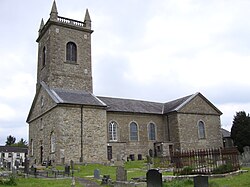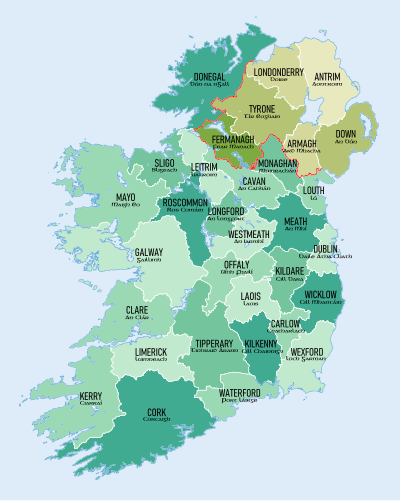Abbreviations and key
| * | current monastic function |
|---|---|
| + | current non-monastic ecclesiastic function |
| ^ | current non-ecclesiastic function |
| = | remains incorporated into later structure |
| # | no identifiable trace of the monastic foundation remains |
| ~ | exact site of monastic foundation unknown |
| ø | possibly no such monastic foundation at location |
| ¤ | no such monastic foundation |
| ≈ | identification ambiguous or confused |
Locations with names in italics indicate probable duplication (misidentification with another location) or non-existent foundations (either erroneous reference or proposed foundation never implemented).
| NIEA | Scheduled Monument (NI) |
| NM | National Monument (ROI) |
| C.I. | Church of Ireland |
| R.C. | Roman Catholic Church |

| Foundation | Image | Communities & provenance | Formal name or dedication & alternative names | References & location |
|---|---|---|---|---|
| Ardboe Monastery |  | early monastic site, founded late 6th century; burned 1166; destroyed by John de Courcey in 1198 | Ard-bo; Arboe | 54°37′10″N6°30′18″W / 54.6195°N 6.50502°W |
| Ardstraw Monastery | early monastic site, founded by St Eugene; diocesan cathedral c.581; see transferred to Maghera c.1152; erenaghs until early 17th century | Ard-stratha; Ard-strath; Cenel-Eoghain; Kinel-eoguin | [1] [2] 54°44′04″N7°27′31″W / 54.734492°N 7.45860°W | |
| Ardtrea Monastery | early monastic site, nuns founded 5th century by St Trea | Artrea; Ard-trega | [3] [4] 54°37′38″N6°40′33″W / 54.627282°N 6.675965°W | |
| Ballinesaggart Friary | Franciscan Friars, Third Order Regular? | |||
| Ballynasaggart Friary | Franciscan Friars, Third Order Regular founded c.1489 by Con O'Neal; dissolved before 1607? | Baile-na-sagart; Baile-i-dhalaigh Balenesegert | [5] [6] [7] 54°27′28″N7°04′32″W / 54.457653°N 7.075692°W | |
| Priory of Our Lady of Benburb * | Servite Friars founded 1949 at a mansion in the demesne of Benburb Castle | [8] 54°24′30″N6°44′31″W / 54.4084373°N 6.7418193°W | ||
| Bodoney Monastery # | early monastic site, founded 5th century by St Patrick; St Patrick's C.I. parish church possibly built on site | Badoney; Both-domnaich | [9] [10] [11] 54°45′46″N7°09′49″W / 54.76287°N 7.16364°W | |
| Brantry | Franciscan Friars Minor, Conventual — place of refuge from Armagh | [12] [13] 54°27′36″N6°51′44″W / 54.4599572°N 6.8623256°W | ||
| Cappagh Monastery |  | early monastic site, patron St Eoghan; erenaghs until 16th century | Ceapach; Kappagh Cappaghquoart | [14] [15] 54°40′05″N7°18′17″W / 54.668007°N 7.304794°W |
| Carrickmore Monastery |  | early monastic site, founded by St Columba | Temple termonmaguirk?; Termon Cumainig | [16] [17] [18] 54°35′57″N7°02′59″W / 54.599134°N 7.049600°W |
| Clogher Abbey — St Mary | Augustinian Canons Regular — Arroasian transferred from cathedral (see immediately below) before 1183; dissolved before 1600? | St Mary | ||
| Clogher Abbey — St Macarten's Cathedral |  | early monastic site, founded 5th century by St Patrick; episcopal diocesan cathedral 1111; Augustinian Canons Regular founded after 1135; Augustinian Canons Regular — Arroasian adopted after 1140; see transferred to Louth c.1138; transferred to new site (see immediately above) before 1183; see returned 1192; CI episcopal diocesan cathedral from 8 August 1542 | St Macarten ____________________ Clochar | [19] 54°24′39″N7°10′19″W / 54.410833°N 7.171944°W |
| Clonfeacle Monastery | early monastic site, founded before 597; Culdees united to Armagh c.950; site possibly occupied by St Jarlath's RC Church | Cluain-fiachne; Cluain-fiacul | [20] [21] 54°24′38″N6°42′32″W / 54.4106415°N 6.7088388°W | |
| Corickmore Abbey |  | Franciscan Friars, Third Order Regular founded before 1500; dissolved c.1603; granted to Sir Henry Piers; assignee Sir Daniel Lee | Caorock; Comrac; Corrock | [22] 54°44′22″N7°17′56″W / 54.7393454°N 7.2989237°W |
| Donaghanie Monastery |  | early monastic site, founded by St Patrick | Domnach an Eich; Donnagh an egh | [23] [24] [25] 54°33′39″N7°13′18″W / 54.560808°N 7.221675°W |
| Donaghedy Monastery |  | early monastic site, patron St Caidinus (Bishop Caoiti); erenaghs until early 17th century | Domnach-caoide | [26] 54°53′10″N7°17′35″W / 54.886082°N 7.293178°W |
| Donaghenry Monastery | early monastic site, founded by St Patrick | inDomnuch Camri; Dompnaghfynner; Domhnach Fainre; Donaghendry | [27] [28] [29] 54°35′23″N6°42′24″W / 54.589687°N 6.706618°W | |
| Donaghmore Monastery |  | early monastic site, founded 5th century by St Patrick; dissolved after 1172; burned 1195; shrines owned by Culdees 1291; in use as parochial church 1306; rectory owned by Culdees until 16th century; church remains visible to 19th century; damaged high cross re-erected 18th century; (NIEA) | Domnach-mor-maige-imclair | [30] [31] 54°31′52″N6°48′48″W / 54.5310374°N 6.8132508°W |
| Donaghrisk Priory |  | order unknown founded 1294 by a member of the O'Hagan family | Domnach-riascad; Donarisk | [32] [33] 54°36′31″N6°44′32″W / 54.608569°N 6.742359°W |
| Dromore Abbey |  | Cistercian monks purportedly founded on the site of early nunnery (see immediately below); burnt 1690; | [34] 54°30′45″N7°27′47″W / 54.51260°N 7.46297°W | |
| Dromore Monastery | early monastic site, nuns, founded by St Patrick; purportedly on the site of later Cistercian abbey (see immediately above) | Druim-Dubhain Cluain-Dubhain | ||
| Drumragh Monastery |  | early monastic site, patron St Colmcille; erenagh land until 16th/17th century | Druim-raithe; Dromeraa; Little Abbey | [35] 54°34′28″N7°17′39″W / 54.574394°N 7.294268°W |
| Dungannon Friary | Franciscan Friars, Third Order Regular founded c.1489 by Con O'Neal (Con McHenry McOwen); dissolved 1607; granted to Richard Nugent, Baron of Delvin 1611 | Ballysaggart; Ballinesaggirt Baile Sagairt | [36] [37] 54°30′03″N6°46′09″W / 54.500854°N 6.769120°W (approx.) | |
| Dungannon Friary | Franciscan Friars, First Order founded after the Restoration 1687; dissolved 1817 | |||
| Dunmisk Monastery | early monastic site, founded by St Patrick; patron Presbyter Meascáin | Domnach Meascáin; Domnach Mescan; Dún Meascáin | [38] [39] [40] [41] 54°34′52″N7°01′50″W / 54.581052°N 7.030447°W | |
| Errigal Keerogue Monastery | | early monastic site, patron St Ciaran, founded before 506 by St Macartin; Franciscan St Kieran's church built on site | Airecal-da-chiaroc; Errigal Keeroge | [42] 54°27′31″N7°05′53″W / 54.4586671°N 7.0979904°W |
| Glenarb Monastery | early monastic site | Cluain-oirb; Clonarb | [43] [44] 54°23′38″N6°50′13″W / 54.3937554°N 6.8368934°W (approx.) | |
| Kilskeery Monastery | early monastic site, founded 749; erenagh into 16th century | Cell-scire; Kilskirry | [45] 54°26′30″N7°32′26″W / 54.4418°N 7.5404476°W (approx.) | |
| Leckpatrick Monastery |  | early monastic site; erenagh land until after 1600 | Cell-patrick; Magherynelec | [46] [47] 54°52′01″N7°25′22″W / 54.866911°N 7.422897°W |
| Longfield Monastery | early monastic site; erenagh at least until 1609 | Lemchaill; Leamcoil; Lauchyll; Langfield | ||
| Magheraglass Priory | early monastic site, probably founded 6th century by St Columcille; Augustinian Canons Regular — Arroasian dependent on Armagh; founded 1242 by Terence O'Hagan; possibly dissolved by c.1400; converted into a fortress by the O'Hagans during the Elizabethan wars | Magh-erir-di-ghlais; Maghcolum-cille; Maghlemchailli? | [48] 54°38′36″N6°50′45″W / 54.6433545°N 6.8459421°W (approx.) | |
| Omagh Friary | Franciscan Friars, Third Order Regular founded 1464; dissolved c.1603; granted to Sir Henry Piers, assigned to Sir Daniel Lee; an ivy-clad wall along the riverbank by Abbey Bridge is purportedly part of a monastic foundation | An-Omach; fOmach; Ogmag; Oghmagh | 54°36′09″N7°18′22″W / 54.6025962°N 7.3060518°W | |
| Omagh Monastery | early monastic site, apparently founded by 792 (though may refer to Drumragh, supra) | |||
| Pubble Friary | Franciscan Friars, Third Order Regular founded before 1500; dissolved c.1603; granted to Sir Henry Piers, assigned to Sir Daniel Lee | Popu; Pobul; Puble | [49] 54°43′27″N7°24′14″W / 54.7242702°N 7.4039417°W (approx.) | |
| Scarvagherin Friary |  | Franciscan Friars, Third Order Regular founded c.1456; dissolved c.1603; granted to Sir Henry Piers | Scairb-an-ciothrainn; Garvaghkeirinn; Gervaghkerin | [50] 54°42′48″N7°31′18″W / 54.7133885°N 7.5215297°W |
| Strabane Friary | purported Franciscan Friars, Third Order Regular founded 14th century; [notes 1] (though Franciscans did not arrive until late 17th century); merged with Scarvaherin, supra | [51] [52] 54°49′37″N7°27′42″W / 54.8268617°N 7.4615336°W | ||
| Termonamongan Monastery |  | early monastic site, founded 6th century, patron St Caireall, erenaghs at least to c.1411 | Termon-ui-mhaoin; Magherakeel; Kylchyrryll; Cill Chairill; St Caireall's church | [53] [54] [55] 54°39′52″N7°43′02″W / 54.664462°N 7.717191°W |
| Termonmaguirk Monastery | early monastic site, purportedly founded by St Colmcille; land owned by the Maguirk family 16th century | Termon-cumaing; Termon-Comyn | 54°33′29″N7°10′21″W / 54.5581468°N 7.1725059°W (approx.) | |
| Trillick Monastery | early monastic site, purportedly founded by 613 | Trelec-mor; Trelick | [45] 54°27′08″N7°29′21″W / 54.4520961°N 7.4891353°W (approx.) |
